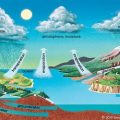在PTE中,无论是Summarise Spoken Text 还是 Re-tell Lecture的考题大都是从真实的讲座或者演讲中截取的中间经常经常夹杂很多不同的环境音.很多同学都反映有时未必是听不懂,而是听不到. 鉴于此,墨尔本悉尼文波雅思PTE专门为大家总结了真实讲座的PTE练习音频,相比新闻音频来说,整体更加接近PTE考试的真题,内容方面,我们也会为大家提供考试中存在的近似题,最近我们会持续更新,敬请期待!
Imaging a country emerging from decades of conflicts, how does it begin rebuilding its economy and ensure opportunities for all its people? Or another country of 20 million people, but only 10% paid their taxes. Not enough tax payers means not enough money for roads and hospitals. How does the government provide essential services to its people? These are the challenges the International Monitory Fund deals with every day. The IMF works with the governments to modernise their economy policies and institutions and helps train their people. This helps country strengthen their economies and create more jobs. By working with government agencies and staff, the IMF helps countries manage revenues and budgets, modernise banking and legal systems, improve economic analysis and forecasting and enhance the reporting of macroeconomic data. For instance, when a new country Kosovo emerged from conflict, it had virtually no banks. With the support from the government of Japan, the IMF worked with Kosovo to set up its central bank operations. This paved the way for commercial banks to provide basic financial services to people and businesses. When Liberia wanted to establish an efficient way to pay for public services, the IMF worked with the government to develop its tax policies, strengthen its taxpayer service programmes and support the establishment of the Liberia Revenue Authority. This afforded the government’s effort to better in dirt the Ebola crisis. When government works well, people thrive. The MIF’s work enables governments to provide better services, such as schools, roads and hospitals. It fosters a stable economic environment and most importantly, it helps growth and create jobs.





